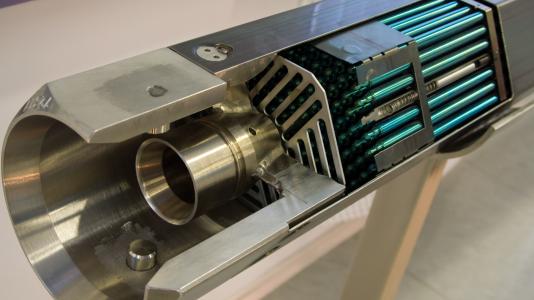 The US Department of Energy’s (DOE’s) Argonne National Laboratory (ANL) is supporting three companies developing a range of new advanced reactor and fuel cycle concepts. The work is funded through a voucher programme provided by the Gateway for Accelerated Innovation in Nuclear (GAIN) programme established by DOE’s Office of Nuclear Energy.
The US Department of Energy’s (DOE’s) Argonne National Laboratory (ANL) is supporting three companies developing a range of new advanced reactor and fuel cycle concepts. The work is funded through a voucher programme provided by the Gateway for Accelerated Innovation in Nuclear (GAIN) programme established by DOE’s Office of Nuclear Energy.
Under one award ANL will work with California start-up Radiant Industriesto perform numerical modelling of heat production and removal in Radiant’s advanced high-temperature gas-cooled microreactor concept. The Kaleidos microreactor is portable. ANL nuclear engineer April Novak said this type of reactor is quite different from conventional reactors because of its small size. “It is targeting diverse applications for nuclear energy, such as remote communities and electric vehicle charging,” she noted. “I find it rewarding to see Argonne’s research applied to a commercial concept that has potential to expand nuclear energy’s role in addressing climate change.”
Novak will help create high-fidelity computational fluid dynamics models of the microreactor in shutdown conditions, including its passive heat removal systems. One of these heat removal systems is an air jacket, which consists of a thin layer of ambient air between the reactor and the shielding. "The air jacket is designed to passively remove decay heat, improving the safety of nuclear power production,” Novak said. The award will also help researchers identify the heat sources in the reactor, based on how fuel is burned, Novak added.
Radiant CEO Doug Bernauer said: “We plan to be the first new commercial reactor design to achieve a fuelled test in more than 50 years. Full commercialisation for advanced reactors will require widespread, ongoing partnership across DOE and several national labs like Argonne and Idaho National Lab.” ANL’s work on Kaleidos supported by GAIN is an extension of earlier work performed through the Nuclear Energy Advanced Modelling and Simulation programme.
The second GAIN award project is with California-based Oklo, which is working on small fast reactors as part of the Aurora product line. ANL nuclear engineer Darius Lisowski will lead a team that will help to test high-flow coolant over pin bundles designed by Oklo. These pins are fabricated and tested using capabilities recently established at Argonne. “We initially built this facility for the Versatile Test Reactor, and our experience will serve us well in helping Oklo bring their reactor concept into reality,” Lisowski said.
"Basically because of the internal geometry there’s a lot of interesting physics about how the coolant mixture will flow across the pins,” Lisowski added. “We’re looking at extreme flow conditions — over 800 gallons of water a minute — to look at the pressure drop through various sections of the assembly.”
The third project involve a team led by ANL nuclear engineer Melissa Rose looking at reactors powered and cooled by a molten salt mixture. Although no molten salt reactors are currently commercially in use, Rose said a molten salt reactor is conducive to nuclear fuel recycling via pyroprocessing, a technology developed at Argonne. “About 97% of nuclear fuel can theoretically be used; it’s just contaminated by fission products that have to be separated out,” she said. “A molten salt reactor could get us closer to a closed fuel cycle in which much of the nuclear fuel is used over and over again.”
In a molten salt reactor, the fuel is dissolved in the molten salt and the liquid moves through the reactor. In the GAIN-funded programme, Rose is working with Flibe Energy, based in Alabama. Flibe is pursuing a molten fluoride reactor that could be used for both energy generation and to provide medical isotopes.
Argonne developed and maintains specialised facilities that Rose and her colleagues will use to measure the properties of these molten salts. These include melting point, phase behaviour, heat capacity and thermal diffusivity, Argonne’s analysis of these properties will help Flibe bring their reactor closer to construction. This is Argonne’s seventh GAIN voucher for measuring properties in support of molten salt reactors.
Image: ANL is supporting three companies developing a range of new advanced reactor (above) and fuel cycle concepts under a DOE program (courtesy of ANL)






